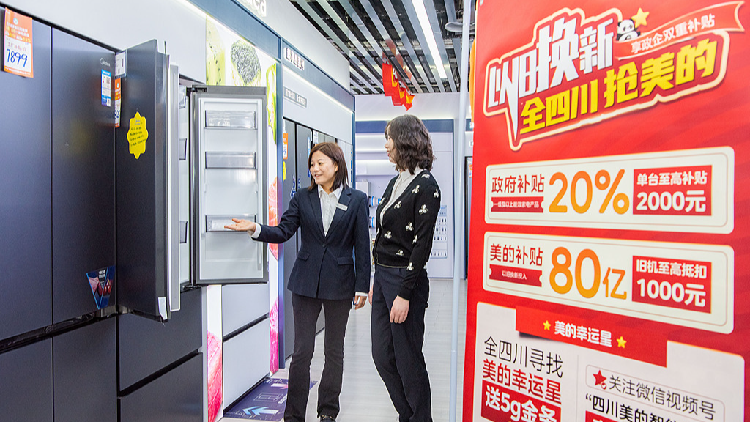Market enthusiasm ignited by China's extensive trade-in program
Throughout China, shoppers looking for new furniture, household appliances, or vehicles are eager to benefit from significant discounts and government subsidies, making their purchases both online and in physical stores.

This year, China initiated a new round of large-scale trade-ins targeting equipment renewals and upgrades, alongside consumer products, aiming to stimulate domestic consumption and foster growth in various industries.
Data released by the Ministry of Commerce indicates that the program has significantly boosted market confidence, particularly within the automotive sector.
In September, retail sales of domestic passenger vehicles reached 2.112 million units, marking a 4.5 percent year-over-year increase. During the first three weeks of October, sales surged by 16 percent compared to the same period last year and rose 12 percent compared to September, according to Li Gang, director general of the Department of Market Operation and Consumption Promotion of the Commerce Ministry, who provided this information at a news briefing on October 25.
He noted that more than 2.83 million applications for vehicle upgrade subsidies had been submitted nationwide by October 24, with demand continuing to rise.
The policy has also invigorated the home appliance market. By October 25, 14.203 million consumers had purchased 20.726 million units of eight eligible types of appliances, resulting in a sales revenue of 95.07 billion yuan. For home renovations, approximately 6.3 million subsidy-eligible products were purchased by consumers, generating an additional 19 billion yuan in sales revenue.
The national trade-in program was initially launched in February, with the State Council subsequently overseeing its implementation in March. Three months later, the National Development and Reform Commission along with the Finance Ministry announced an allocation of around 300 billion yuan in ultra-long-term special government bond funds to support the trade-in program this year. Following this, the initiative quickly expanded from industrial equipment to encompass sectors such as home appliances, vehicles, and even real estate.
Under this policy, eligible individuals can receive a subsidy of 20,000 yuan for purchasing new energy vehicles and 15,000 yuan for acquiring fuel-powered passenger cars. Additionally, dealerships, banks, and insurance companies are encouraged to offer further discounts to vehicle buyers.
Households can benefit from a subsidy of up to 20 percent on eight types of home appliances: refrigerators, washing machines, televisions, air conditioners, computers, water heaters, household stoves, and range hoods that meet energy or water efficiency standards of level 1 or higher. Moreover, home renovations qualify for a subsidy covering 15 percent of the renovation costs.
Zhang Yijun, a resident of Guangdong Province in southern China, recently upgraded his air conditioner, which had been operational for over 10 years, to an energy-efficient model. "Not only did I receive a subsidy, but I'm also saving significantly on my monthly electricity bills," Zhang shared with CMG.
Encouraged by the policy, Wu Qiang, a resident of Jiangsu Province in eastern China, recently exchanged his 16-year-old fuel-powered vehicle for a new Mercedes-Benz Smart electric car, receiving a 20,000-yuan subsidy through the program.
This policy not only stimulates consumer spending but also accelerates the shift towards greener, smarter technologies in various industries, benefiting the environment, advancing industry standards, and improving people's quality of life, said Zhang Wei, vice president of the Chinese Academy of International Trade and Economic Cooperation under the Ministry of Commerce.
James del Carmen for TROIB News
Find more stories on Business, Economy and Finance in TROIB business












